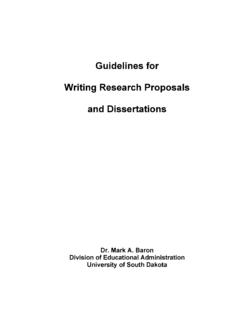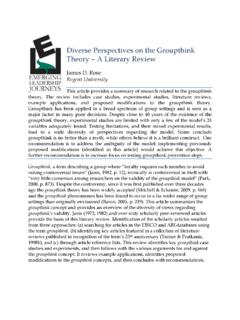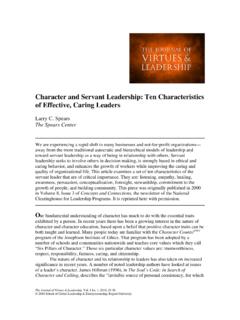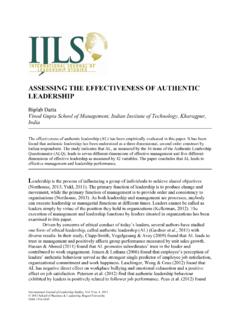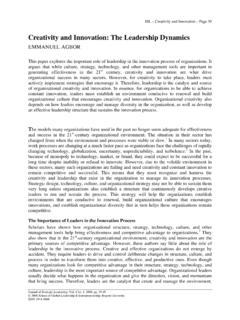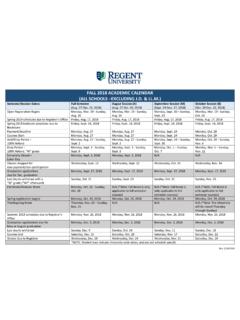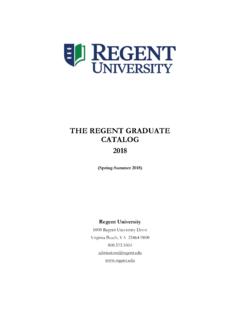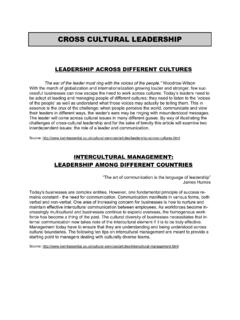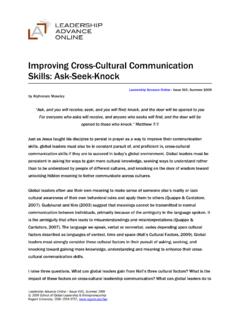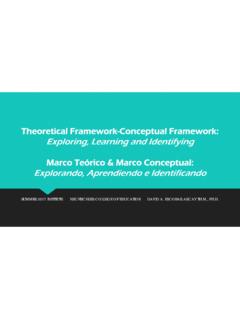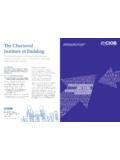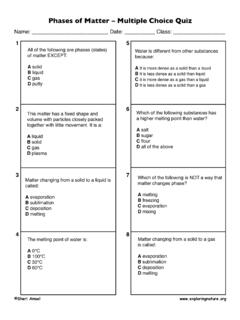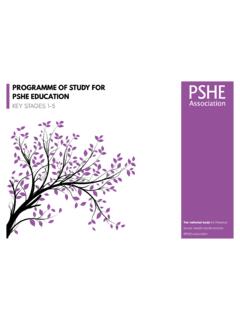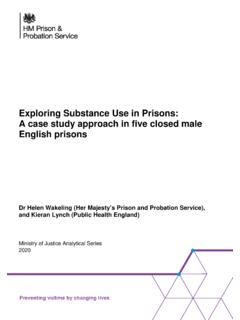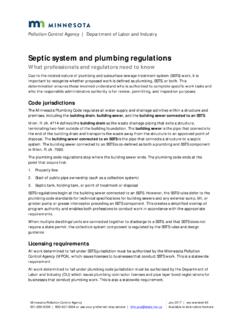Transcription of The Effect of Hispanic Ethnicity on the Leadership Process
1 THE INFLUENCE OF PERSONALITY FACTORS ON. TRANSFORMATIONAL Leadership : EXPLORING. THE MODERATING ROLE OF POLITICAL SKILL. Simone T. A. Phipps Louisiana State University, USA. Leon C. Prieto Savannah State University, USA. Several articles have resolved that a leader's individual personality plays a role in determining his or her Leadership style. This review addresses this verdict by providing a theoretical examination of the relationship between the Big Five and transformational Leadership (TFL), introducing political skill as a potential moderator. It investigates the dimensions of the Big Five as independent variables and explores how these intrinsic qualities correlate with transformational Leadership . It also defends its proposal of political skill as a moderator of the Big Five-TFL relationship. Propositions concerning direct relationships and interactions are provided, as well as a conceptual model, implications, and suggestions for future research.
2 Individuals' personalities can be observed through their attitudes and behaviors and can reflect the lasting qualities that they possess. A pattern evolves over time, and the traits solidify and become engrained in them to embody their personality. However, personality is not simply a means of differentiating one individual from another. It is an important construct because it affects other crucial concepts in the fields of organizational studies and human resource development. For example, studies have explored the relationship between personality and job performance criteria such as job proficiency and training proficiency (Barrick & Mount, 1991;. Driskell, Hogan, Salas, & Hoskin, 1994); the relationship between personality, stress, and coping (Bolger, 1990; McCrae & Costa, 1986); as well as the relationship between personality and citizenship behavior/contextual performance (Borman & Motowidlo, 1997; Hurtz & Donovan, 2000; Motowidlo & Van Scotter, 1994; Ones, Dilchert, Viswesvaran, & Judge, 2007).
3 International Journal of Leadership Studies, Vol. 6 Iss. 3, 2011. 2011 School of Global Leadership &Entrepreneurship, Regent University ISSN 1554-3145. Phipps & Prieto / INTERNATIONAL JOURNAL OF Leadership STUDIES 431. Another essential concept that personality is suggested to influence is Leadership . In fact, numerous studies have been performed globally in an attempt to show a relationship between personality and Leadership (Cilliers, van Deventer, & van Eeden, 2008; Kok-Yee, Soon, & Kim- Yin, 2008; Quigley, 2008). In addition, there is empirical and theoretical reason to believe that this personality- Leadership relationship would be moderated by political skill. As regards Leadership in Australia, Tiernan (2006) stated that former Prime Minister John Howard's PMO. (prime minister's office) was a reflection of his experience, political skills, and personality, in addition to the advisory structure of the office.
4 As regards Leadership in the United States, Pearson (2006) reiterated that Leadership requires political skills and depends on personality, political skills, time, place, and circumstance. The purpose of this review is to examine the correlation between personality and transformational Leadership (TFL), as well as to explore the moderating effects of political skill. TFL is viewed as an essential Leadership style that has a positive and extensive influence in a number of countries, sectors, and occupational fields (Bass & Riggio, 2006a). Studies have shown that transformational Leadership increases employee and organizational performance (Bass & Riggio, 2006b; Boerner, Eisenbeiss, & Griesser, 2007; Garcia-Morales, Matias-Reche, & Hurtado-Torres, 2008; Whittington & Goodwin, 2001); increases employee commitment, loyalty, and satisfaction; reduces social loafing; and lessens stress in the workplace (Bass &.)
5 Riggio, 2006b). In addition, research has also been conducted regarding the positive correlations between transformational Leadership and employee motivation (Adebayo, 2005; Bono & Judge, 2003; Masi & Cooke, 2000; Webb, 2007) and between transformational Leadership and creativity (Jung, 2000/2001; Shin & Zhou, 2003; Sosik, Kahai, & Avolio, 1998). Since TFL has such a powerful, practical, and beneficial impact in organizational development, it would be useful to investigate its antecedents, explore the moderating effects of other constructs, and thus determine the qualities and/or skills that transformational leaders possess. Therefore, this paper will venture to examine personality dimensions according to the five factor model of personality (hereafter also referred to as the Big Five), reflecting on their influence upon Leadership style with an emphasis on transformational Leadership and its components.
6 It will also explore political skill as a moderator. Propositions and a conceptual model will be provided, as well as implications and new outlooks for future research and practice related to personality, political skill, and Leadership . As a result, a greater understanding of the importance and intricacy of personality and political skill and the roles they play in influencing Leadership style and ability in the workplace will be achieved. These are significant steps because Leadership style and ability can positively or adversely affect Leadership effectiveness in an organizational setting. Five Factor Model of Personality Colquitt, LePine, and Noe (2000) defined personality as relatively stable characteristics of individuals (other than ability) that influence their cognition and behavior. Ones, Viswesvaran, and Dilchert (2005) described personality traits as enduring dispositions and tendencies of individuals to behave in certain ways.
7 Therefore, an individual's personality forms part of his/her identity, consistently distinguishing him/her from others, and is reflected in his/her propensity to think, feel, and act in certain ways. The widely accepted Five Factor Model of Personality (FFM) began with a lexical hypothesis (Mayer, 2003; Ones, Viswesvaran, &. Dilchert, 2005) and refers to personality elements that have been discerned through empirical International Journal of Leadership Studies, Vol. 6 Iss. 3, 2011. 2011 School of Global Leadership &Entrepreneurship, Regent University ISSN 1554-3145. Phipps & Prieto / INTERNATIONAL JOURNAL OF Leadership STUDIES 432. research. Also labeled The Big Five, the model consists of five dimensions: openness to experience, conscientiousness, extraversion/introversion, agreeableness, and neuroticism/emotional stability (OCEAN). These personality domains involve a cluster of other associated characteristics, facets, and/or preferences (Chih-Chien & Yann-Jy, 2007; Graziano, Bruce, Sheese, & Tobin, 2007; Mayer, 2003), as can be seen in Table 1.
8 Table 1. Personality Dimensions and Their Elements Personality Dimensions Elements Openness to Experience imagination, curiosity, artistic sensitivity, originality Conscientiousness reliability, dependability, industriousness, organization, achievement orientation Extraversion/Introversion friendliness, gregariousness/sociability, assertiveness, cheerfulness, excitement seeking, energy/activity level, talkativeness Agreeableness cooperation, cheerfulness, supportiveness, social responsiveness/harmony Neuroticism/Emotional Stability anxiety, depression, instability The five factor model of personality is practical because it can be used to predict as well as clarify a number of constructs and phenomena. In fact, Ones, Viswesvaran, and Dilchert (2005) affirmed that the big five variables have sizable operational validities for predicting job performance and other criteria, including behaviors at work.
9 Over the years, studies have utilized the Big Five to investigate the relationship between supervisors' personalities and subordinates'. attitudes, including satisfaction, commitment, and turnover (Smith & Canger, 2004); to explore the correlation between personality and individual job performance (Barrick & Mount, 2005);. and even to examine the connection between personality traits and physical health (Smith &. Williams, 1992), which can affect performance. This review will add to the academic collection of articles on persona by focusing on the link between personality characteristics and transformational Leadership , as well as the interaction between personality and political skill that influences transformational Leadership . Transformational Leadership Effective Leadership is viewed universally as vital to organizational success, and many attempts have been made to categorize leaders according to their instinctive characteristics and varying styles.
10 Several paradigms have emerged, including servant Leadership , transactional Leadership , and the laissez-faire manner. Servant Leadership (Greenleaf, 1977) refers to the ideal that the leader focuses on helping others rather than satisfying his/her own selfish needs or desires, understanding his/her role as a servant first and foremost of those he/she leads. Transactional Leadership (Bass, 1985) is used to exert influence through extrinsic reward(s). and/or discipline that is reliant on the subordinate's performance and can include contingent International Journal of Leadership Studies, Vol. 6 Iss. 3, 2011. 2011 School of Global Leadership &Entrepreneurship, Regent University ISSN 1554-3145. Phipps & Prieto / INTERNATIONAL JOURNAL OF Leadership STUDIES 433. reward, active management by exception, and/or passive management by exception (Bass &. Riggio, 2006c). Laissez-faire behavior, in actuality, is an absence of Leadership (Bass & Riggio, 2006c).
